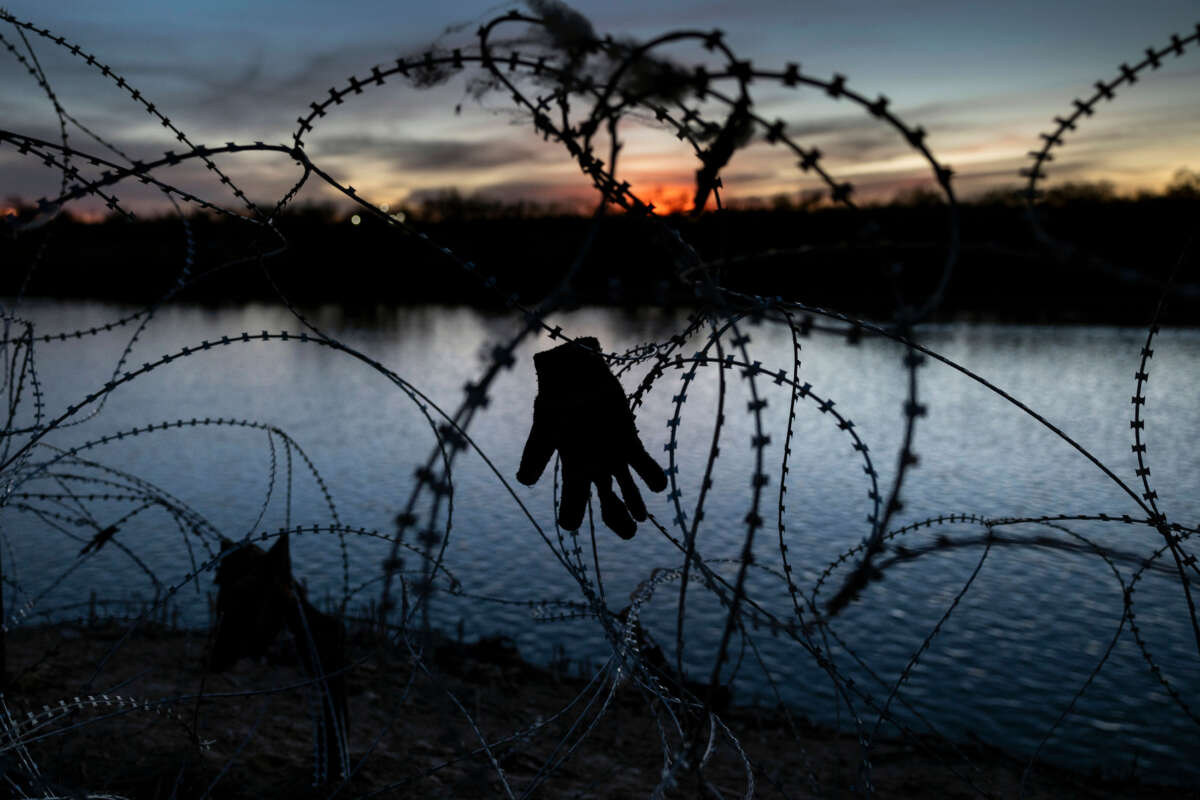The Supreme Court on Monday reversed a lower court’s injunction on federal action to remove razor wire installed by Texas state officials last fall on a stretch of the state’s border with Mexico.
Gov. Greg Abbott (R-Texas) ordered the razor wire to be installed in October to deter migrants from crossing a 29-mile stretch of land along the Rio Grande River. Migrant rights organizations have said the order violates international law, and has resulted in numerous horrific injuries for migrants attempting to cross the barrier. At least one internal email from a Texas state trooper described the razor wire barriers as “inhumane.”
U.S. Border Patrol agents began removing the wire later that month, resulting in the state suing the agency in federal court in order to halt that action.
In November, a federal judge placed an injunction on the action to continue removing the barrier pending the completion of the lawsuit. The U.S. government appealed that order to the Fifth Circuit Court of Appeals, which affirmed the ruling from the judge. The federal government then filed an emergency appeal to the U.S. Supreme Court, which disagreed with both the federal judge’s and appellate court’s rulings.
In filing its appeal to the Supreme Court, the Department of Homeland Security (DHS) claimed that allowing the lower courts’ rulings to stand would redefine the supremacy clause of the U.S. Constitution, leaving the federal government “at the mercy of States” in trying to implement a national immigration strategy.
The two-paragraph order from the High Court was unsigned and didn’t delve into the justices’ legal views on the matter. Four justices from the Court — Clarence Thomas, Samuel Alito, Neil Gorsuch and Brett Kavanaugh — indicated that they dissented with the majority opinion, signaling that it was a 5-4 decision and that Justices Sonia Sotomayor, Elena Kagan, Ketanji Brown Jackson, Amy Coney Barrett and Chief Justice John Roberts sided with the federal government.
The ruling doesn’t end the case altogether, but rather focuses only on the injunctive order from the lower court. Texas and the U.S. government will still adjudicate the question within the court on whether the state can place razor wire in the area, and whether it can be removed by Border Patrol officials.
In a statement on X (formerly known as Twitter), Abbott promised to continue challenging the federal government on the matter.
“This is not over,” Abbott said. “Texas’ razor wire is an effective deterrent to the illegal crossings Biden encourages. I will continue to defend Texas’ constitutional authority to secure the border and prevent the Biden Admin from destroying our property.”
Aaron Reichlin-Melnick, policy director at the American Immigration Council, challenged Abbott’s assertions.
“Texas’ shenanigans didn’t cause migrants to stop crossing the border,” Reichlin-Melnick said, adding that the action “has just caused slightly fewer crossings in a section of the border that amounts to 0.1% of the border’s length (2 miles out of 2,000).”
Immigration lawyer Cyrus Mehta also stated that the Supreme Court ruled correctly on this case.
“Biden rightly wins over Texas here. A state cannot and should not be able to dabble in immigration issues which the federal government occupies,” Mehta said.
Angry, shocked, overwhelmed? Take action: Support independent media.
We’ve borne witness to a chaotic first few months in Trump’s presidency.
Over the last months, each executive order has delivered shock and bewilderment — a core part of a strategy to make the right-wing turn feel inevitable and overwhelming. But, as organizer Sandra Avalos implored us to remember in Truthout last November, “Together, we are more powerful than Trump.”
Indeed, the Trump administration is pushing through executive orders, but — as we’ve reported at Truthout — many are in legal limbo and face court challenges from unions and civil rights groups. Efforts to quash anti-racist teaching and DEI programs are stalled by education faculty, staff, and students refusing to comply. And communities across the country are coming together to raise the alarm on ICE raids, inform neighbors of their civil rights, and protect each other in moving shows of solidarity.
It will be a long fight ahead. And as nonprofit movement media, Truthout plans to be there documenting and uplifting resistance.
As we undertake this life-sustaining work, we appeal for your support. We have 9 days left in our fundraiser: Please, if you find value in what we do, join our community of sustainers by making a monthly or one-time gift.
